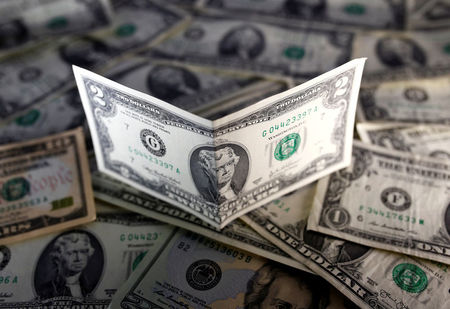
Investing.com – The U.S. dollar steadied Tuesday as investors look forward to the release of key economic data, including Friday’s U.S. payrolls, that could cement an interest rate cut from the Federal Reserve later this month.
At 04:05 ET (09:05 GMT), the Dollar Index, which tracks the greenback against a basket of six other currencies, traded largely unchanged at 101.617, just below Monday’s two-week high of 101.79.
The index fell 2.2% in August on expectations of U.S. rate cuts.
Dollar focuses on labor market
The U.S. ISM manufacturing survey later in the session is the first major indicator out in a big week for U.S. data, and is expected to show that the country’s manufacturing sector remains in contraction territory.
However, it’s the labor market that will be in the spotlight this week as Fed policymakers look for confirmation that it’s time to start easing monetary policy, particularly after Fed Chair Jerome Powell last month endorsed an imminent start to interest rate cuts in a nod to the worries over the labour market.
Friday’s key nonfarm payrolls release will be the week’s key number, particularly and the previous month’s labor report fell short of expectations, prompting a sharp selloff in equity markets on recession fears.
Ahead of that, job openings data on Wednesday and the jobless claims report on Thursday will be in the spotlight.
Markets are pricing in a 69% chance of a 25 basis points cut when the Fed meets on Sept. 17-18, with a 31% probability of a 50-bps cut, CME FedWatch tool showed.
Euro nears two-week low
In Europe, EUR/USD traded 0.1% lower to 1.1061, not far from the two-week low of 1.1042 it touched in the previous session after data showed eurozone manufacturing activity remained in contraction territory in August.
The European Central Bank cut interest rates in June and looks likely to do so again later this month, particularly after eurozone inflation fell to 2.2% in August, a more than three-year low.
Traders are also looking at the uncertain political situation in Germany after the Alternative for Germany became the first far-right party to win a state legislature election in Germany since World War Two.
“It seems that investors were rapidly reassured of the political situation after all other German parties appeared determined to keep the far-right AfD away from power after their win in Thuringia,” said analysts at ING, in a note.
“At the same time, the ruling coalition appears increasingly weak, and we cannot exclude some damage to the euro from EU politics down the road. Especially when adding a likely turbulent EU budget season this fall.”
GBP/USD dropped 0.2% to 1.3129, with the U.K. data calendar very quiet this week.
Sterling had a strong August, and has gained over 2% in the course of the last month, boosted by expectations that the Bank of England will keep interest rates high for longer than in the United States and the eurozone.
Yen bounces back
In Asia, USD/JPY fell 0.6% to 146.03, falling back from the two-week high of 147.16 hit on Monday after data showed Japan’s factory activity contracted again in August, a private-sector survey showed earlier Monday.
USD/CNY traded largely flat at 7.1161, while AUD/USD fell 0.6% to 0.6750, ahead of the Australian gross domestic product report due on Wednesday.
This post is originally published on INVESTING.



